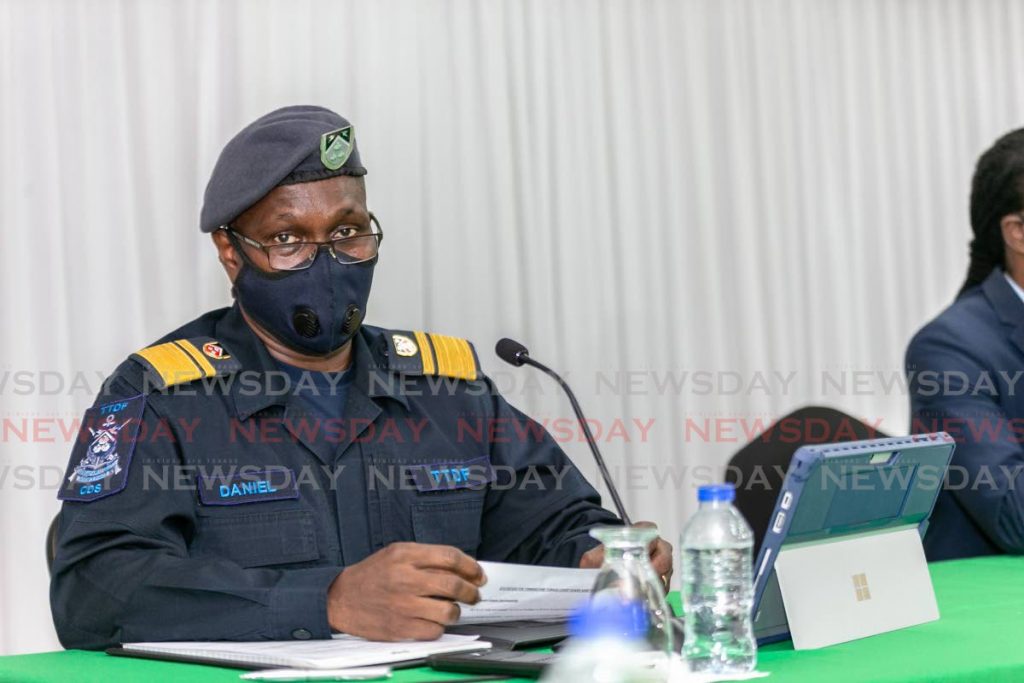Joint patrols with police biggest challenge for Defence Force

WHILE the defence force is currently operating with half of its naval fleet, its biggest challenge is members doing patrols with police, because that is not part of their training.
Speaking to a joint select committee (JSC) on March 15 that was recorded and replayed on Monday, Chief of Defence Staff Air Vice Marshal Darryl Daniel, when asked what was the biggest challenge facing the TT Defence Force, said members ``maintaining their core training responsibilities.” He added that any country with a military would want its military to remain so and not be transformed into law enforcement.
“When we go out and do patrols with police, we are doing something that, generally, we haven’t trained for, and it puts my personnel in a challenging position, because their training is to do certain things, and it is not law enforcement. It is not 'to protect and serve.' (The motto of the police.) That is the biggest challenge.”
To address that, he said the defence force trains police on operational planning and executing operations effectively, which he said is something the police may not be experts at, when compared to the military. This is part of the defence-force plan to make the police proficient in running operations and make them more effective, and thereby more successful.
“This will result in the requirement of the defence force not being there working alongside the police. Until then, we will continue to do it, because we have been doing it for some time.”
THE JSC was titled “Evidence session to gain an understanding of the collaboration between the defence force and the police in the implementation of anti-crime strategies to address criminal activity.”
Lieut ColAshook Singh, director of operations for the defence force, told the JSC the police and army joint patrols began in 2001, “when criminal gangs and illegal guns persisted,” resulting in the formation of the Inter-Agency Task Force to deal with gang violence.
He added that with the increase in the ease of gangs' acquiring guns with greater sophistication and quantities of ammunition, the police requested more help from them.
“In 2017 the defence force increased assistance to the police to conduct patrols in all divisions and collaborated on intelligence sharing. In 2021, there were 11,333 joint patrols and in 2022 there were 8824 patrols,” Singh said, adding that the difference in patrols came as a result of the state of emergency, when the defence force carried out patrols by themselves.
Responding to questions about the available fleet, Daniel told the JSC that it is currently operating at 50 per cent capacity, as seven of its vessels are in need of maintenance and are dry-docked. He explained that at the beginning of the pandemic, the maintenance crew returned to the Netherlands and the defence force is renegotiating the contract for maintenance. He added that there is some work that can be done internally, but his members are awaiting the necessary parts to do those repairs.
Four of the six Damen vessels bought by the People’s Partnership are in need of upkeep, along with two utility craft and one fast patrol vessel, Daniel told the JSC.
On ammunition with the marking “TTR” being found at crime scenes, Daniel said the issue is a serious matter as “a bullet is a life” and the report coming out of an internal audit showed there were no ammunition missing as he awaits the outcome of a police investigation to explain how that is possible.
“We are very challenged to understand how rounds are appearing out there when our audit would have shown we can account for everything we have.”
He added that something is very wrong if the defence force can account for all its ammunition, but some is appearing at crime scenes, especially with a very stringent mechanism in place for using arms and ammunition, where each gun and bullet must be signed for when leaving and accounted for on return.
“In the military a bullet is a life, so we don’t play around with that,” he said, adding that the audit is not generally given to police unless a request is made, and at the time of the recording no request had been made.
Inspector General Lieut Coll Sheldon Ramanan, whom Daniel appointed to do the audit, said while it has been completed, the report is only 95 per cent complete. He said the audit was commissioned in December last year, but was delayed by members of the defence force at the 14 installations across the country contracting covid19.

Comments
"Joint patrols with police biggest challenge for Defence Force"